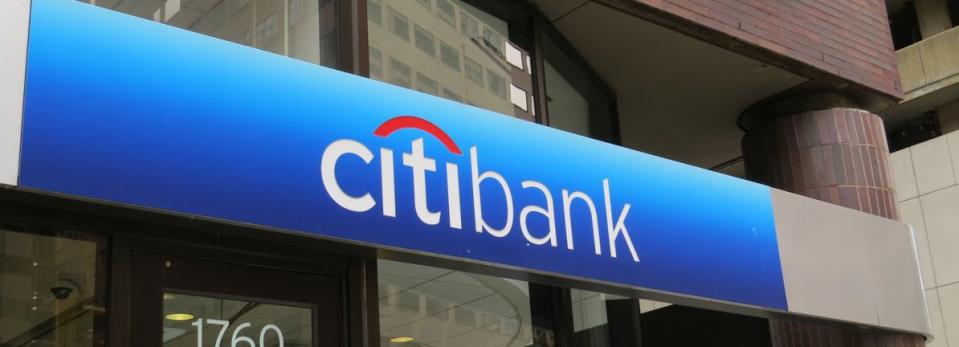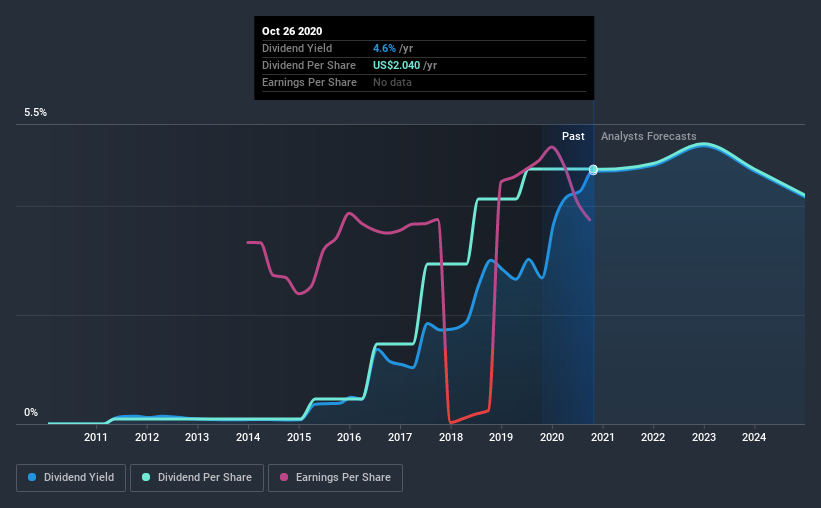Here's What We Like About Citigroup's (NYSE:C) Upcoming Dividend

Citigroup Inc. (NYSE:C) stock is about to trade ex-dividend in three days. Ex-dividend means that investors that purchase the stock on or after the 30th of October will not receive this dividend, which will be paid on the 25th of November.
Citigroup's next dividend payment will be US$0.51 per share, on the back of last year when the company paid a total of US$2.04 to shareholders. Based on the last year's worth of payments, Citigroup stock has a trailing yield of around 4.6% on the current share price of $43.95. We love seeing companies pay a dividend, but it's also important to be sure that laying the golden eggs isn't going to kill our golden goose! So we need to investigate whether Citigroup can afford its dividend, and if the dividend could grow.
View our latest analysis for Citigroup
If a company pays out more in dividends than it earned, then the dividend might become unsustainable - hardly an ideal situation. Citigroup paid out a comfortable 39% of its profit last year.
When a company paid out less in dividends than it earned in profit, this generally suggests its dividend is affordable. The lower the % of its profit that it pays out, the greater the margin of safety for the dividend if the business enters a downturn.
Click here to see the company's payout ratio, plus analyst estimates of its future dividends.
Have Earnings And Dividends Been Growing?
Stocks in companies that generate sustainable earnings growth often make the best dividend prospects, as it is easier to lift the dividend when earnings are rising. If business enters a downturn and the dividend is cut, the company could see its value fall precipitously. For this reason, we're glad to see Citigroup's earnings per share have risen 19% per annum over the last five years.
Many investors will assess a company's dividend performance by evaluating how much the dividend payments have changed over time. Since the start of our data, nine years ago, Citigroup has lifted its dividend by approximately 55% a year on average. It's great to see earnings per share growing rapidly over several years, and dividends per share growing right along with it.
The Bottom Line
Is Citigroup worth buying for its dividend? Typically, companies that are growing rapidly and paying out a low fraction of earnings are keeping the profits for reinvestment in the business. Perhaps even more importantly - this can sometimes signal management is focused on the long term future of the business. Overall, Citigroup looks like a promising dividend stock in this analysis, and we think it would be worth investigating further.
With that in mind, a critical part of thorough stock research is being aware of any risks that stock currently faces. In terms of investment risks, we've identified 2 warning signs with Citigroup and understanding them should be part of your investment process.
We wouldn't recommend just buying the first dividend stock you see, though. Here's a list of interesting dividend stocks with a greater than 2% yield and an upcoming dividend.
This article by Simply Wall St is general in nature. It does not constitute a recommendation to buy or sell any stock, and does not take account of your objectives, or your financial situation. We aim to bring you long-term focused analysis driven by fundamental data. Note that our analysis may not factor in the latest price-sensitive company announcements or qualitative material. Simply Wall St has no position in any stocks mentioned.
Have feedback on this article? Concerned about the content? Get in touch with us directly. Alternatively, email editorial-team@simplywallst.com.

 Yahoo Finance
Yahoo Finance 
